Contents
- Description
- Composition of corn oil
- Useful properties of corn oil
- Corn oil for beauty
- Carotene corn oil treats peptic ulcer disease
- And other benefits of corn oil
- Contraindications and harm
- Can I fry in corn oil?
- Corn il in the diet of pregnant women
- Can lactating mothers eat corn oil
- Corn oil for children (age)
- Corn oil and weight loss
Description
Corn oil is valuable for its main components – fatty acids, especially linoleic and linolenic, the content of which in it is significantly higher than in sunflower oil. In addition, the benefits of corn oil lie in the high content of vitamin E (10 times more than in olive oil, 3-4 times more than in sunflower oil).
Its molecule “hunts” for free radicals that damage cells, gives them one electron and thus turns them into a safe substance that is easily removed from the body. Considering that each cell is attacked by free radicals about 10 thousand times a day, one can imagine the titanic labor of vitamin E and the need for it.
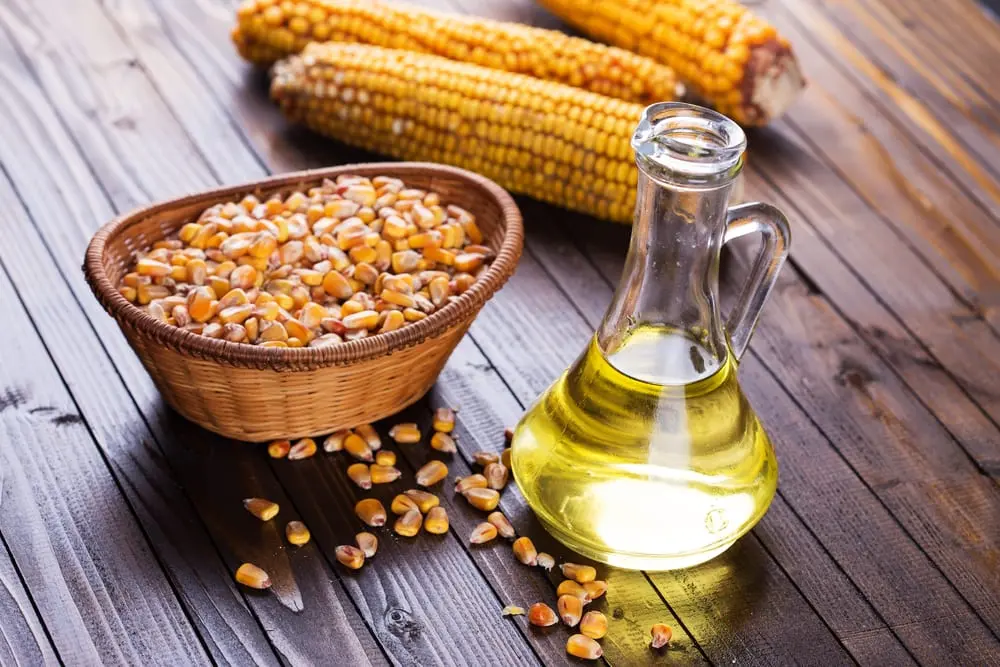
Corn oil is produced by pressing and extraction from corn germ, which constitutes about 10% of the weight of the corn grain. Corn oil has a pleasant smell and taste.
Composition of corn oil
Corn oil contains:
- 23% monounsaturated fatty acids.
- 60% polyunsaturated acids.
- 12% saturated acids.
- From saturated fatty acids: palmitic acid – 8-19%, stearic acid – 0.5-4%
- Monounsaturated fatty acids are mainly composed of oleic acid – 19.5-50%
- Polyunsaturated fatty acids contain: omega – 6 (linoleic acid) – 34 – 62% and omega – 3 (linolenic acid) – 0.1-2%
- It also contains a significant amount of vitamin E – 1.3-1.6 mg / kg and phytosterols 8-22 g / kg.
Useful properties of corn oil
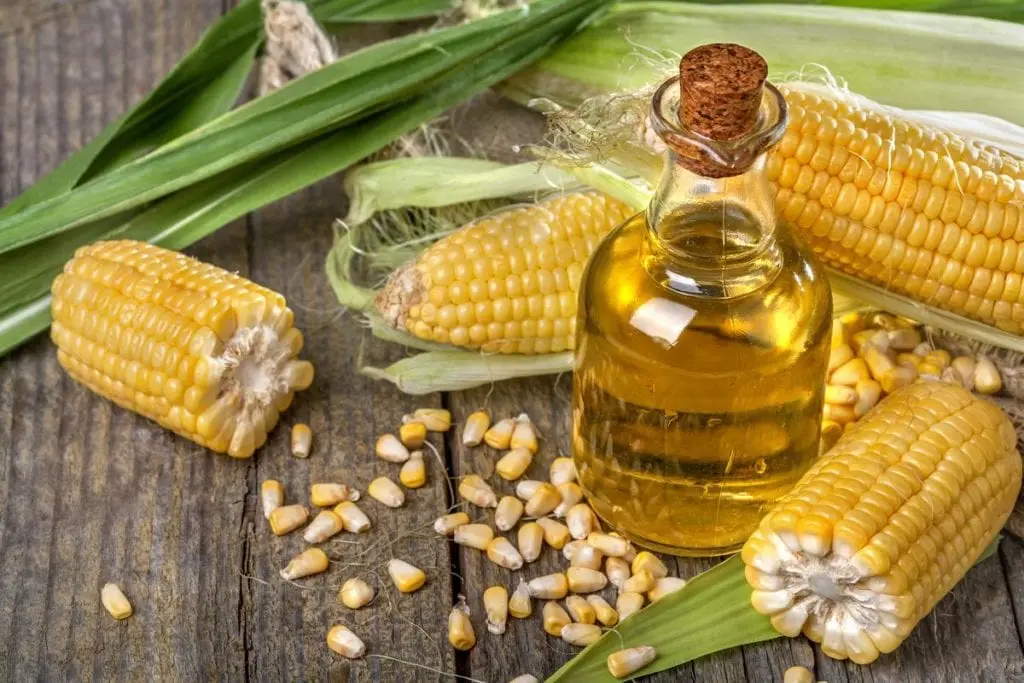
Corn oil is one of the semi-dry oils.
It contains a large amount of omega-6 fatty acids, but very little omega-3 fatty acids, which should be considered when composing a balanced diet.
Phytosterol has the ability to reduce blood cholesterol by more than 15% by decreasing its absorption in the intestines and may work as a cancer-preventing agent.
However, corn oil should be consumed in moderation because, like all vegetable oil, it is very high in calories.
Corn oil is rich in vitamin E (tocopherols), which is an antioxidant. This makes it, on the one hand, very stable, and on the other hand, it contributes to the treatment of diseases related to blood circulation, cardiovascular diseases, neurological and even infertility.
Refined corn oil is very suitable for cooking and frying food, as it does not form harmful substances (carcinogenic) when heated.
Corn oil can be used as a salad dressing along with vinegar and salt.
In the food industry, corn oil is used for the production of margarine, mayonnaise, bread baking, etc.
In cosmetology, corn oil is used to make soaps and hair products.
Corn oil for beauty
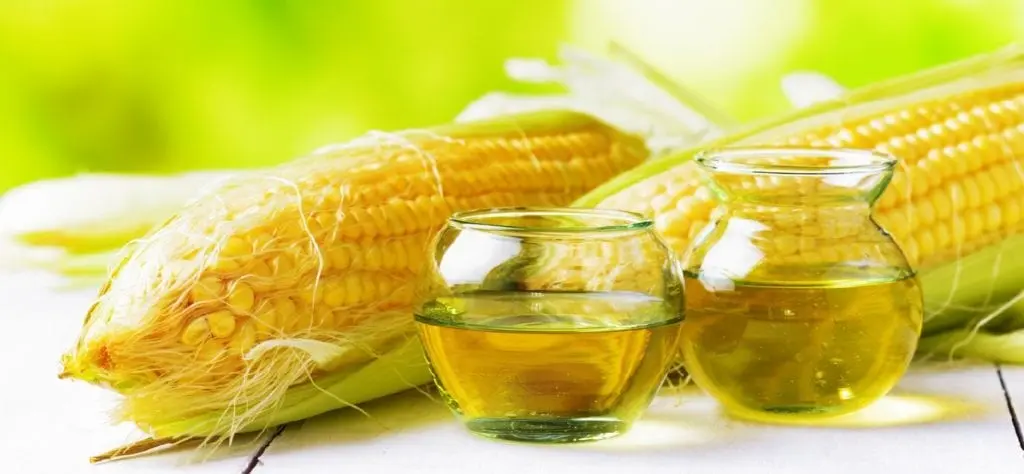
Corn oil is essential for healthy skin. Peeling, dryness, so-called age spots are a sign of a lack of vitamin E. If you use this product for a month, you can get rid of peeling of the eyelids and granulomas of the edges of the eyelids, psoriasis plaques, and improve skin elasticity.
For a healthy scalp, getting rid of dandruff, getting healthy and shiny hair, you should warm up corn oil, rub it into the scalp, then soak a towel in hot water, wring it out and wrap it around your head. Repeat the procedure 5-6 times, and then wash your hair.
Carotene corn oil treats peptic ulcer disease
Corn oil renews the stomach lining, therefore it is indicated for ulcers. You need to pour them a glass of grated carrots in a small saucepan, cover and keep in a water bath.
As soon as the oil boils – turn off the fire, cool the mixture and strain through 2 layers of gauze. You need to use this oil for 1 tsp. 4 times a day 30 minutes before meals, holding in the mouth before swallowing for 3-4 minutes. Some people get nausea, but it can be eliminated with mineral water.
It should be noted that such treatment is also useful for people with impaired vision, damage to the retina, because the combination of the actions of vitamins E and A is good for the eyes.
And other benefits of corn oil
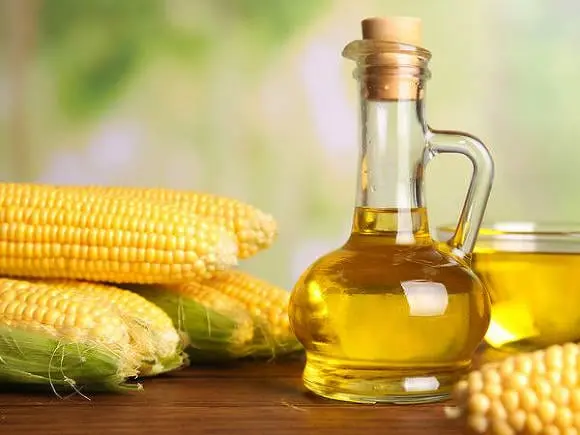
The product increases the contraction of the walls of the gallbladder, due to which the release of bile occurs, and digestion is improved. Therefore, in the case of diseases of the liver, gallbladder, cholelithiasis, atherosclerosis, internal bleeding, hypertension, a monthly course of treatment with corn oil is recommended for therapeutic purposes – twice a day for 1 tbsp. l. before breakfast and dinner.
The value of corn oil also lies in the fact that it changes the body’s alkaline reaction to an acidic one. Therefore, it is recommended for patients with asthma, migraine, hay fever.
However, the treatment with this oil should not be overused. Carry out monthly treatment courses, eat oil with ready-made cereals, salads (vitamins are better preserved this way), but do not shy away from traditional sunflower, and who can, flaxseed, olive, wheat germ oil. They are mega-useful too!
Contraindications and harm
There are few contraindications to the use of corn oil. These include:
- individual intolerance, allergy to product components;
- diseases accompanied by increased blood clotting;
- cholelithiasis.
- In other cases, moderate consumption of the product will only benefit.
Stop using an expired product. If the oil has changed color or is bitter, you will have to throw it away.
Can I fry in corn oil?
Due to its high smoke point, it is excellent for frying in both a pan and deep fat. However, remember that frying is far from the most useful method of preparing dishes: their calorie content increases several times, and there are much fewer useful components. Therefore, try to limit your consumption of foods fried in oil, even as healthy as corn oil.
Corn il in the diet of pregnant women
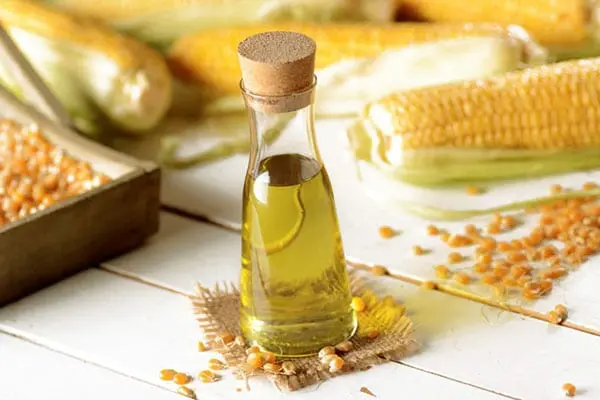
in the I and II trimesters, you can eat the product in any form: season vegetable salads, prepare sauces and homemade mayonnaise, use oil for frying, replacing sunflower oil;
In the third trimester, when the growth of body weight increases, give up fatty and fried foods; during this period, corn oil is best used in light salads;
If you’ve never tasted corn oil before, start with a small amount (1 tsp).
If during the day there is no abdominal discomfort and upset stool, the daily intake of the product can be increased;
reduce the amount of product consumed to 1 tsp. per day, if you are worried about pain under the right rib, nausea are the first symptoms of problems with the gallbladder, which are common during pregnancy.
Can lactating mothers eat corn oil
Doctors are sure: the diet of a nursing mother should be as varied as possible (with the exception of foods that cause excessive gas formation). Corn oil fits perfectly into the diet of a breastfeeding woman, and nutritionists recommend replacing the sunflower oil we are used to.
The rate of use of the product during breastfeeding is 2 tbsp. l. oils per day. At the same time, corn oil can be used to prepare certain dishes from the first days of a baby’s life. Frying on it is not worth it: for nursing mothers, cooking, baking or stewing with the addition of a small amount of oil remains the best way of cooking.
Corn oil for children (age)
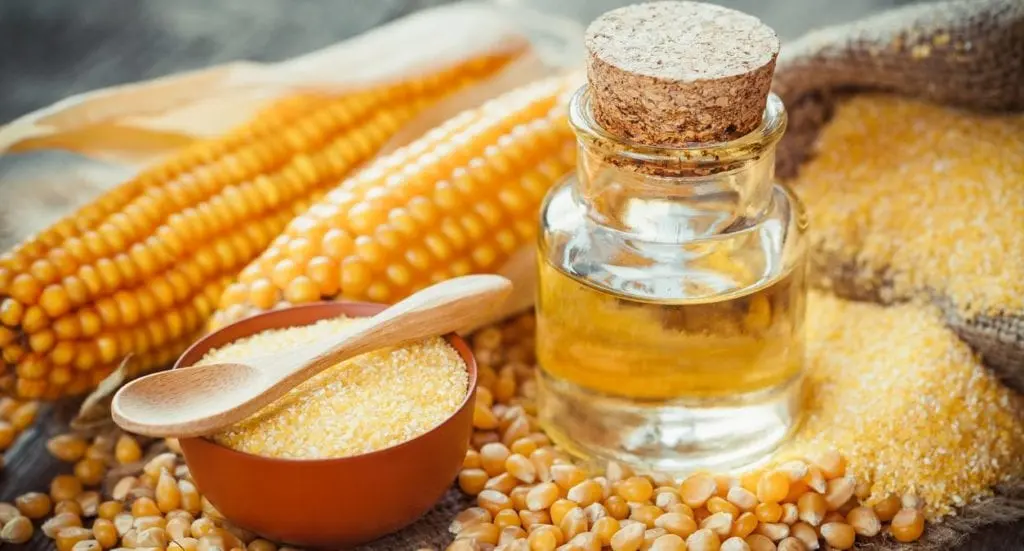
Corn oil should not be chosen to introduce your baby to vegetable fats. It is better if the first oil that you add to complementary foods will be natural cold-pressed olive.
Towards 8 months, try adding healthy corn oil to the crumbs’ diet – add a couple of drops to a serving of vegetable puree, carefully place and feed your baby as usual. During the day, observe the reaction – has the baby become capricious, does not show anxiety, does he have problems with his tummy? If all is well, add up to 5 drops of corn oil to vegetable or meat foods.
Corn oil and weight loss
If we consider the remedy as a “magic pill” that will allow you to lose weight without changing your usual diet, then the answer to this question will be negative. But if you enlist the support of this useful and vitamin product and reconsider your views on nutrition, extra pounds will melt before our eyes:
- completely replace harmful animal fats with corn oil;
- use the product for dressing light vegetable salads;
- eat oil only fresh and do not use it for frying (and generally exclude fried foods from the diet);
- allowed amount of corn oil – 2-3 tbsp. l. per day.









